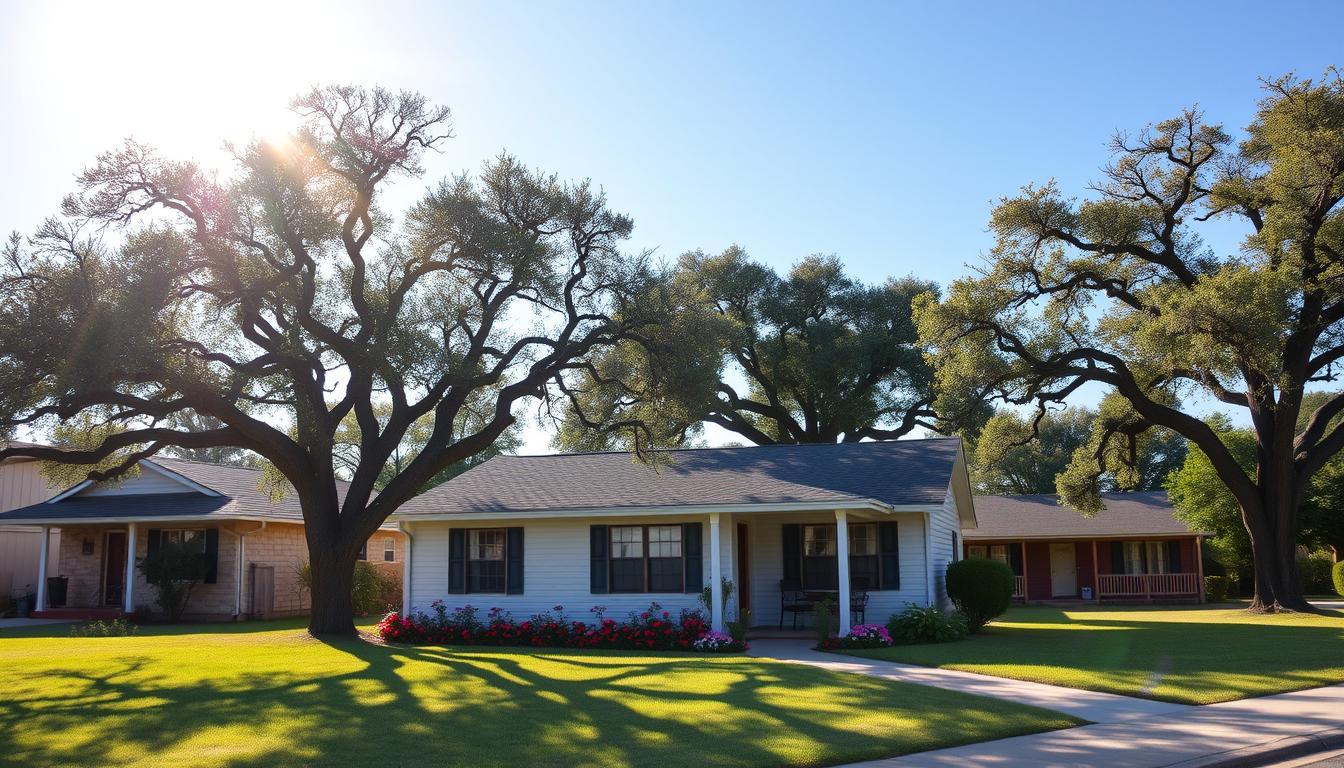Many people in Texas wonder when seniors can stop paying property taxes. As retirement approaches, the idea of saving money is very appealing. However, the truth is that taxes don’t just stop at a certain age. Texas offers special tax breaks to help seniors save on property taxes. It’s important for seniors to know about these options for better financial planning. Let’s explore how property taxes work for seniors and unveil some benefits they could get.
Key Takeaways
- Property owners in Texas over the age of 65 can qualify for a tax exemption on their primary residence.
- Eligible individuals must own the property and use it as their primary residence.
- Spouses over the age of 55 can continue the tax exemption if the qualifying homeowner passes away.
- Disabled homeowners aged 65 and older may defer property tax payments or apply for homestead exemptions.
- Additional benefits like an extra $10,000 reduction in property value are available for seniors.
Understanding Property Taxes in Texas
Property taxes in Texas fund local services like schools, roads, and public safety. Knowing about property taxes helps homeowners manage their finances better.
What are Property Taxes?
Property taxes are charges on real estate, based on the property’s value. They are key for local governments to provide services. In Texas, these tax rates vary by county and school district. Homeowners, especially seniors, should understand these differences for effective financial planning.
How Property Taxes are Assessed in Texas
In Texas, county districts assess property taxes by evaluating market value. They look at recent sales and property details to set a fair value. It’s crucial for seniors to know about this, as they might get tax breaks.
Looking for savings on house purchases? Consider pre-foreclosure homes. But, be aware of possible issues like repairs or title risks before committing.
| County | Average Property Tax Rate | Seniors Exemption Available |
|---|---|---|
| Travis | 1.99% | Yes |
| Harris | 2.31% | Yes |
| Dallas | 2.19% | Yes |
| Bexar | 2.09% | Yes |
At What Age Do Seniors Stop Paying Property Taxes In Texas?
It’s crucial for seniors to know about property tax duties to handle their money well. The idea that seniors stop paying property taxes entirely at a certain age isn’t quite right. Even though they get big tax breaks, they still have to pay some taxes, which varies by local laws.
The Truth About Property Tax Obligations
In Texas, seniors 65 and older get different property tax breaks. These breaks can greatly lower their property taxes. For instance, in North Richland Hills, 28% of homeowners 65 or older get these benefits. This leads to an average tax saving of $552.63 in 2023 for those with the senior exemption.
Not only does the senior exemption reduce the taxable value of homes by $36,000, but it also prevents tax increases in the future. Every five years, starting in 2024, property owners need to confirm their eligibility with the Tarrant Appraisal District to keep these breaks.
Eligibility for Property Tax Exemptions at Age 65
To be eligible for senior property tax relief in Texas, one must be at least 65 and live in the home as their main place. If married, only one partner has to be 65. The relief can also depend on income, property value, and living in the area. In Tarrant County, seniors get a 20% homestead exemption on top of senior exemptions, increasing their total tax relief.
Homeowners facing hard times can look into foreclosure bailout schemes for help. These programs are designed to help avoid losing one’s home.
| Exemption Type | Property Tax Reduction | Eligibility Criteria |
|---|---|---|
| Senior Exemption | $36,000 reduction in taxable value | Aged 65 or older, primary residence |
| Tax Freeze | Prevents future tax increases | Aged 65 or older, primary residence |
| Homestead Exemption | 20% reduction from appraised value | Owner-occupied property |
Property Tax Exemptions for Seniors in Texas
Seniors in Texas have access to property tax exemptions. These breakups lessen the financial load. They ensure that seniors can keep their homes without stress.
Senior Freeze Exemption Explained
The senior freeze exemption is a big help for those over 65. It freezes their property taxes at the rate when they turned 65. This setup means no tax increases as long as they qualify, helping seniors plan their finances without fearing tax hikes.
Additional $10,000 Exemption for Seniors
Besides the freeze, Texas offers seniors an extra $10,000 off their home’s taxable value. This comes with the homestead exemption. So, it majorly cuts the tax bill, helping seniors stay financially stable.
It’s important for seniors to understand these tax breaks. They can also look for help to prevent losing their homes. Grants and assistance programs are there to ease the burden of owning a home.
Senior Citizen Property Tax Relief in Texas
In Texas, senior citizens can get property tax help. This help is made to give them financial support. By using tax relief programs, seniors can save money. The process to get this help is simple, but they must apply on time.
How to Apply for Property Tax Relief
Seniors in Texas can apply for tax relief by contacting their local appraisal district. They need to do this before April 30th each year. This is for anyone 65 or older, or disabled veterans. When applying, they must show proof of age or disability. They also need to meet living requirements. For more info on buying property, they can check out this resource for help with loans.
Benefits of Tax Relief Programs for Seniors
Seniors get big benefits from tax relief programs. These can save them a lot of money. It makes living day-to-day easier. They don’t have to worry about rising property taxes. For many, this means saving about $1,450 a year on a $330,000 home.
This support gives seniors financial peace. Even as property values go up, tax freezes help. They know what to expect and can enjoy their retirement. This tax relief is crucial for them. It’s a big help for seniors who really need it.
| Program | Eligibility | Key Benefits |
|---|---|---|
| Over-65 Exemption | Aged 65 or older | Freezes property taxes at the current amount |
| Disabled Veteran Exemption | 100% service-connected disability | 100% exemption on residential homestead |
| Tax Freezes | Senior/Disabled homeowners | Limits taxes to the amount paid in qualifying year |
| Deferred Taxes | Homeowners 65 or older | Deferral possibility with 5% interest |
Texas Property Tax Benefits for Elderly Residents
In Texas, understanding property tax benefits can significantly aid elderly residents in managing their finances effectively. A crucial element of these benefits is the tax ceiling established for those aged 65 and older. This ceiling limits their school property taxes to the amount paid during the year they qualified for the exemption.
Understanding the Tax Ceiling
The tax ceiling is a key part of the Texas property tax system. It provides seniors with considerable financial relief. Once a senior turns 65 and qualifies for the 65 or Older Exemption, their property taxes won’t increase.
This freeze ensures that sudden increases do not affect their financial stability. It protects seniors from changing tax rates. Thanks to recent laws, some school tax rates may even go down for seniors, helping them amidst rising property values.
Impact of Property Improvements on the Tax Ceiling
Seniors should be aware that the tax ceiling can change if they improve their property. Significant home improvements can lead to a higher property value and higher taxes. Yet, they still benefit from the tax ceiling.
Homeowners must think about how improvements impact their taxes. Planning is key to avoid surprises in tax bills. Talking to local experts can help understand the ins and outs of Texas property tax benefits for the elderly.
| Type of Exemption | Description |
|---|---|
| 65 or Older Exemption | Limits school taxes to the amount paid in the year the exemption was granted. |
| Disabled Person Homestead Exemption | Provides tax relief for homeowners with disabilities. |
| Ceiling Transfer | Allows seniors moving to a new home to transfer their current home’s tax ceiling. |
For more insights into property tax management, check out BiggerPockets for helpful info on market dynamics.
Conclusion
The topic of when seniors in Texas stop paying property taxes may seem simple. However, it’s actually quite complex. Seniors 65 and older can get tax breaks like the Over-65 Homestead Exemption. This lowers the taxable value of their main home, helping with housing costs.
There’s also a program for seniors to delay paying property taxes until their home is sold or transferred. This deferral can gather interest, but it helps keep their finances stable. Plus, local areas might offer extra tax breaks or freezes on tax increases.
Seniors need to keep up with changes in property tax rules and benefits. Knowing about tax exemptions, relief programs, and deferral options helps with financial planning. This ensures they can stay in their homes worry-free. For more information on managing finances, especially avoiding foreclosure, click here.






